Top 7 Task Apps for GCC Small Businesses

Looking for the best task management apps for small businesses in Bahrain and the GCC? Here's a quick rundown of the top 7 apps that help you stay organised, ensure compliance with local regulations, and handle bilingual communication (Arabic/English). These apps also support VAT tracking, data security, and regional workflows.
Quick List of Apps:
- Todoist Business: AI-driven task automation and cross-platform support.
- Trello Enterprise: Visual boards with enterprise-grade security and flexible scheduling.
- Asana for GCC Teams: Bilingual interface with compliance for GCC data laws.
- Monday.com Localised: Pre-configured GCC holiday calendars and VAT reporting.
- ClickUp GCC Edition: Advanced security features and flexible data hosting.
- Wrike Regional: Agile tools with customisable dashboards for GCC needs.
- Zoho Projects Arabia: Full Arabic support, ZATCA-compliant VAT tools, and local payment integrations.
Why These Apps Stand Out:
- Bilingual Support: Apps like Zoho and Monday.com allow seamless switching between Arabic and English.
- Data Compliance: Platforms like ClickUp and Zoho meet GCC's strict data protection laws.
- VAT Integration: Zoho offers the most robust VAT compliance, including ZATCA certification for Saudi Arabia.
- Local Payment Systems: Zoho integrates with PayTabs, Telr, and Tap Payments for smoother invoicing.
Quick Comparison Table:
| Feature | Todoist | Trello | Asana | Monday.com | ClickUp | Wrike | Zoho |
|---|---|---|---|---|---|---|---|
| Arabic/English Support | Limited | Basic | Partial | Yes | Enhanced | Standard | Full RTL Support |
| VAT Compliance | Manual | External | Limited | Moderate | Advanced | Basic | Full ZATCA Integration |
| Data Hosting | Global | US/EU | Global | Regional | Flexible | Global | Jeddah & Riyadh |
| Local Payment Systems | No | Basic | Limited | Regional | Yes | Moderate | PayTabs, Telr, Tap |
Key Takeaway:
For small businesses in Bahrain and the GCC, Zoho Projects Arabia offers the most GCC-specific features, including bilingual support, VAT compliance, and local payment integrations. If you're looking for flexibility and advanced features, consider ClickUp or Monday.com. Start with free plans to test what works best for your team.
1. Todoist Business
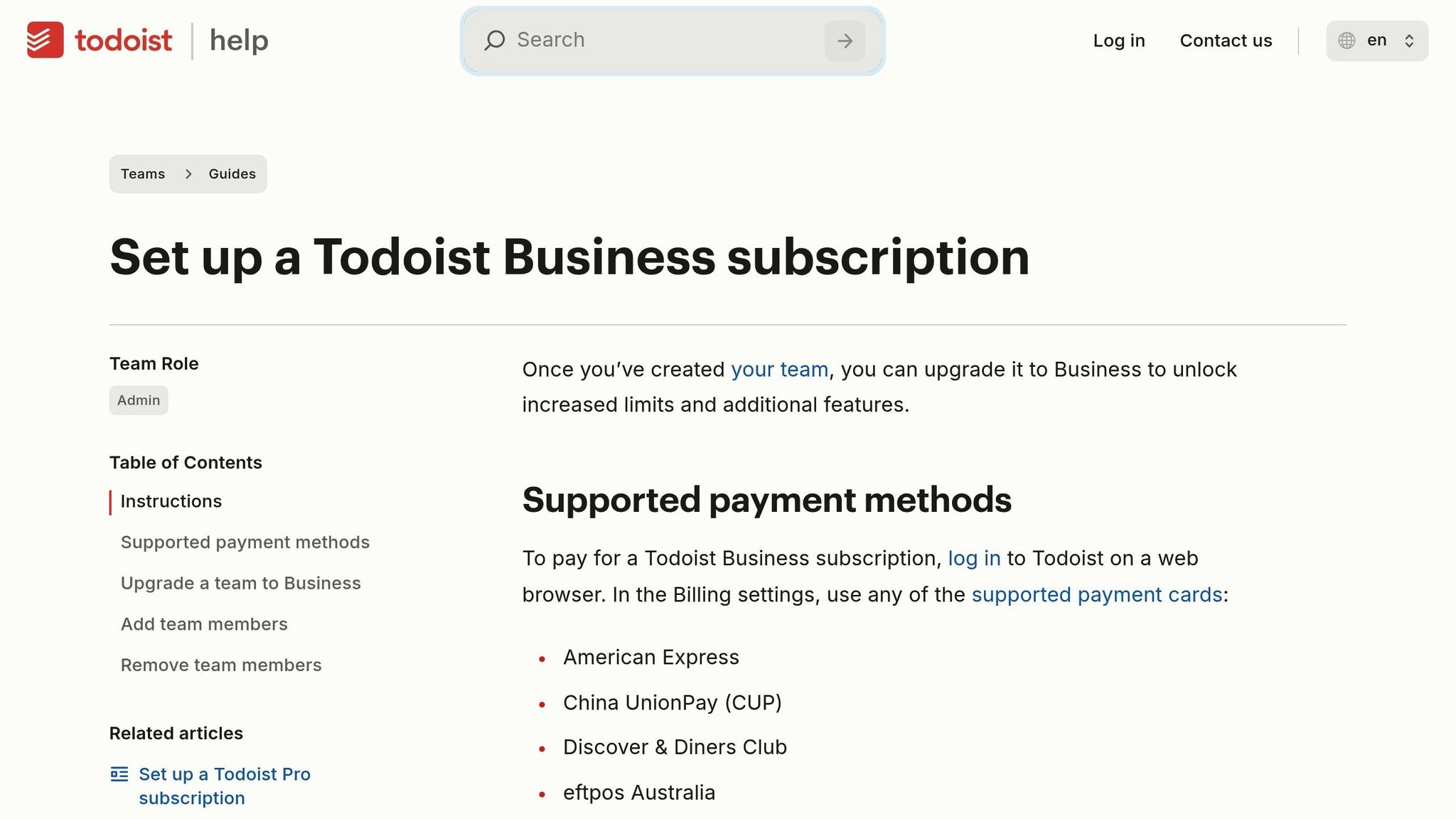
Todoist Business offers a reliable task management solution tailored for small businesses in the GCC region. It comes with flexible scheduling tools that help users organise tasks on a daily, weekly, or monthly basis, even if they’re spread across multiple locations. With its ability to work across various platforms, it’s a handy option for teams operating in different parts of the region.
The app’s cross-platform design ensures that users can seamlessly access their tasks on iOS, Android, web browsers, and even through browser extensions.
What makes Todoist Business stand out is its use of AI-driven tools for task suggestions, prioritisation, and automation. These features are particularly helpful for small businesses juggling multiple projects at once. Paired with its strong scheduling capabilities, Todoist Business caters well to the fast-paced and diverse needs of GCC businesses.
Scheduling Capabilities
The app’s flexibility supports different work routines, making it a practical choice for teams working across varying time zones and business hours.
For example, companies like Wavai have successfully used Todoist to streamline task management and improve productivity workflows.
2. Trello Enterprise
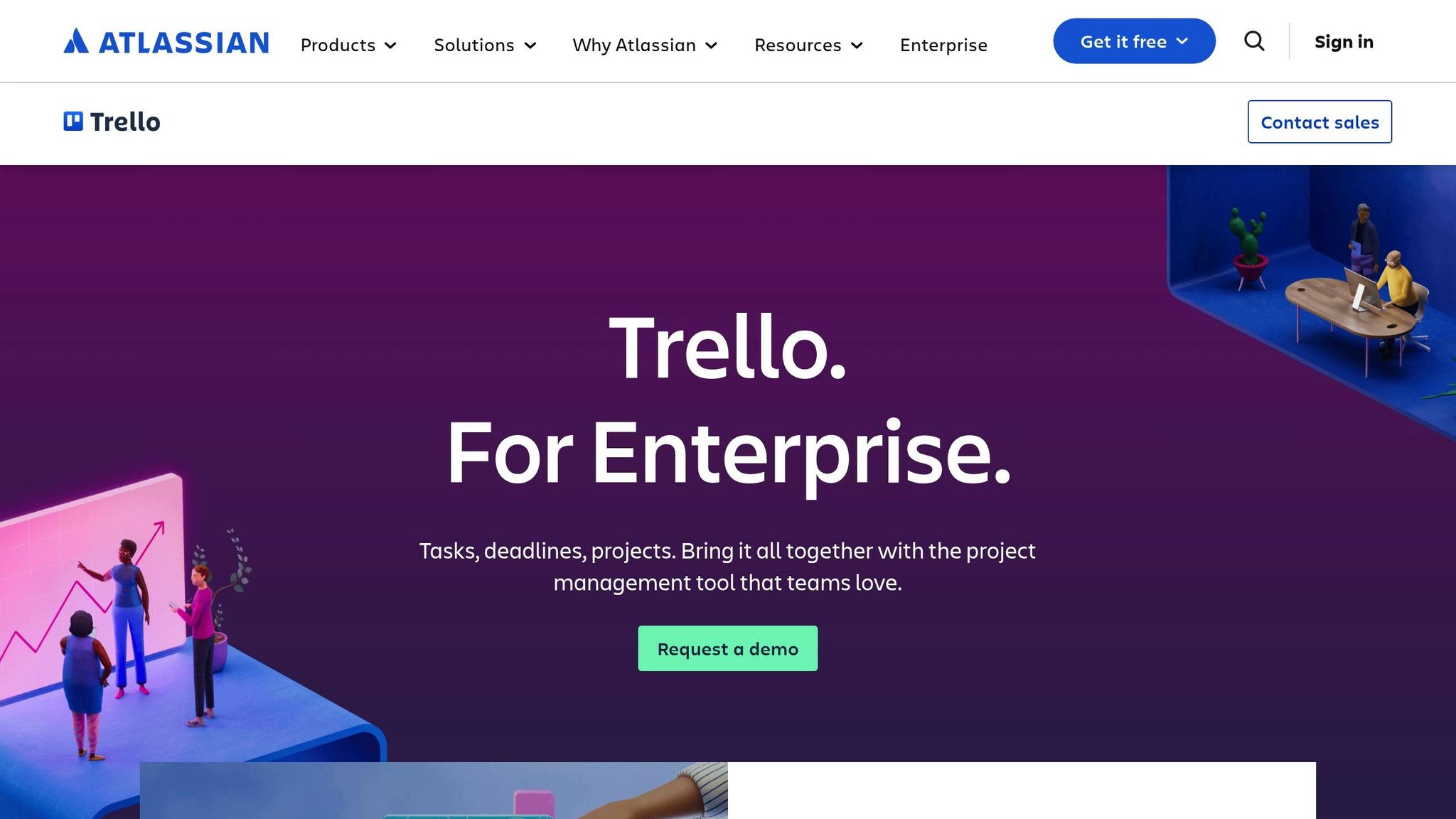
Trello Enterprise brings a card-and-list board system that simplifies project tracking, making it a practical tool for small businesses across the GCC. With enterprise-grade security features, it ensures data is encrypted both at rest and in transit, alongside intrusion detection to safeguard sensitive information. Its impressive 99.99% uptime is particularly critical for businesses that can't afford interruptions. Additionally, its scheduling capabilities are flexible enough to accommodate the diverse work patterns often seen in the GCC.
Flexible Scheduling for GCC Businesses
Trello Enterprise is designed to meet the needs of businesses in the GCC, where flexible and hybrid work models are becoming increasingly common. The platform's features support these arrangements, which align with the region's evolving work practices. A 2023 McKinsey report highlights that companies adopting hybrid work have seen productivity gains, with 59% of employees preferring flexible setups.
The tool's visual boards enable asynchronous collaboration, making it easier to manage projects across various time zones. This flexibility ensures that teams can stay connected and aligned, even when working at different times or from different locations.
Major organisations, such as Deloitte India and KPMG, are already moving towards hybrid work models, recognising the benefits of allowing employees to work when they are most focused and creative. Trello Enterprise supports this shift by helping teams stay on track with goals and deadlines, no matter how or where they work.
Meeting GCC Data and VAT Compliance Standards
For businesses in the GCC, compliance with local data and VAT regulations is a top priority. Trello Enterprise addresses these concerns with robust security and administrative tools. Features like SAML single sign-on and enforced two-factor authentication through Atlassian Guard give administrators better control over user access.
Given the varying regulatory requirements across GCC countries, Trello's admin controls are particularly useful. They allow businesses to manage which third-party apps are integrated into their Trello workspace, ensuring that all data-sharing activities align with local laws.
With its strong security framework and ability to adapt to diverse work environments, Trello Enterprise offers GCC businesses a dependable solution for staying compliant while efficiently managing their operations.
3. Asana for GCC Teams
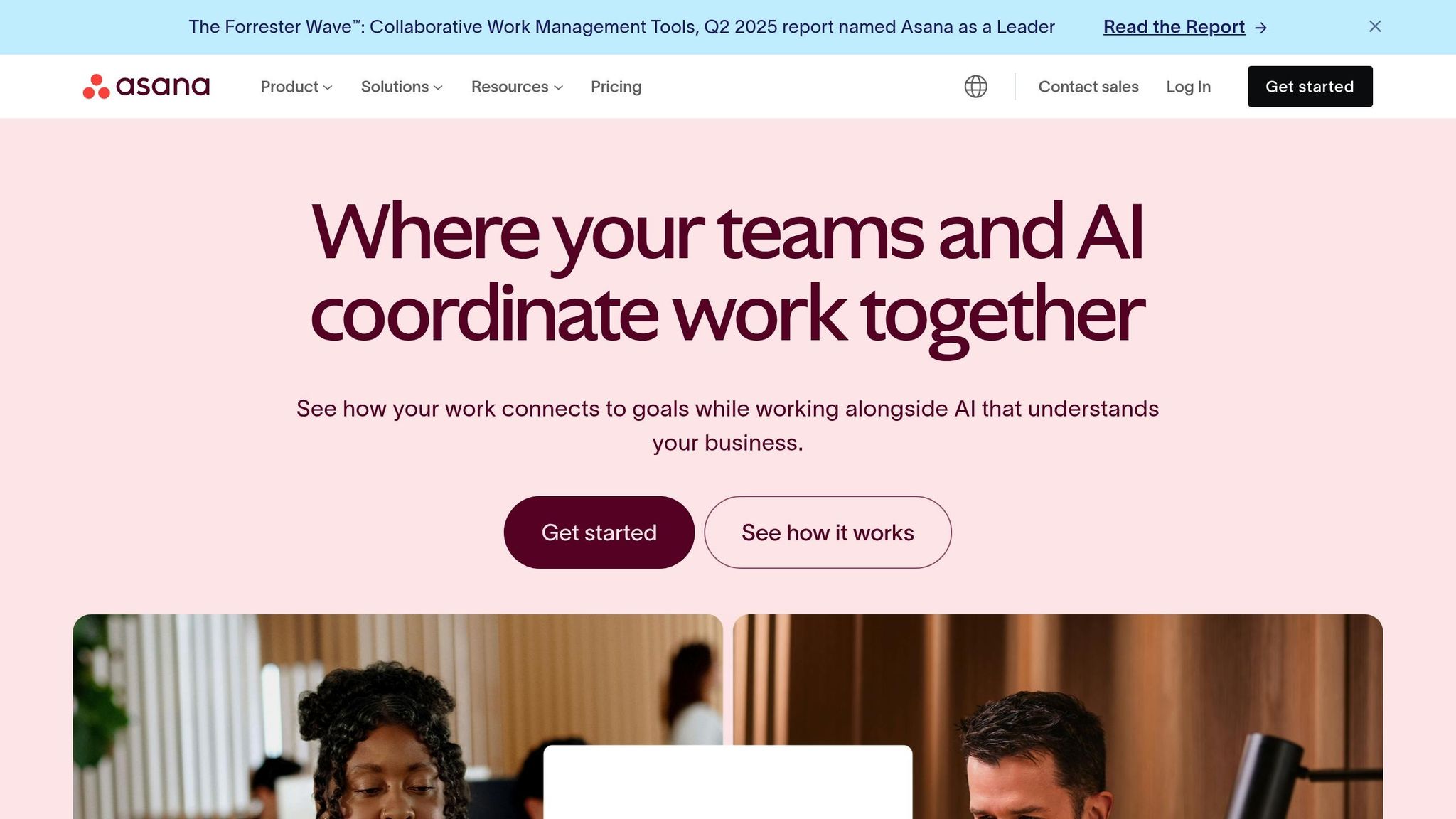
Asana offers a well-rounded project management solution tailored for GCC businesses, combining multilingual capabilities with strong compliance measures. It’s a practical choice for small businesses aiming to streamline task management while adhering to local regulations.
Arabic/English Bilingual Interface
One of Asana’s standout features is its bilingual interface, which allows users to effortlessly switch between Arabic and English. This is especially useful for mixed teams where Arabic-speaking employees collaborate with English-speaking colleagues or international partners. The platform supports right-to-left formatting for Arabic while maintaining the standard left-to-right layout for English, ensuring smooth communication and collaboration across language preferences.
Compliance with GCC Data Regulations
Asana goes beyond language support by addressing the GCC's stringent data security requirements. With built-in security measures and strategic partnerships, Asana is designed to comply with local regulations. For example, Dubai enforces strict rules on data storage, cybersecurity, and TDRA compliance - areas where many global SaaS providers fall short. A UAE consulting firm once faced AED 100,000 in fines for non-compliance with DIFC data privacy laws. Asana’s framework protects businesses from such risks by aligning with local data protection standards. This is particularly beneficial for industries like banking, healthcare, and government, allowing companies to focus on growth without worrying about regulatory pitfalls.
4. Monday.com Localised
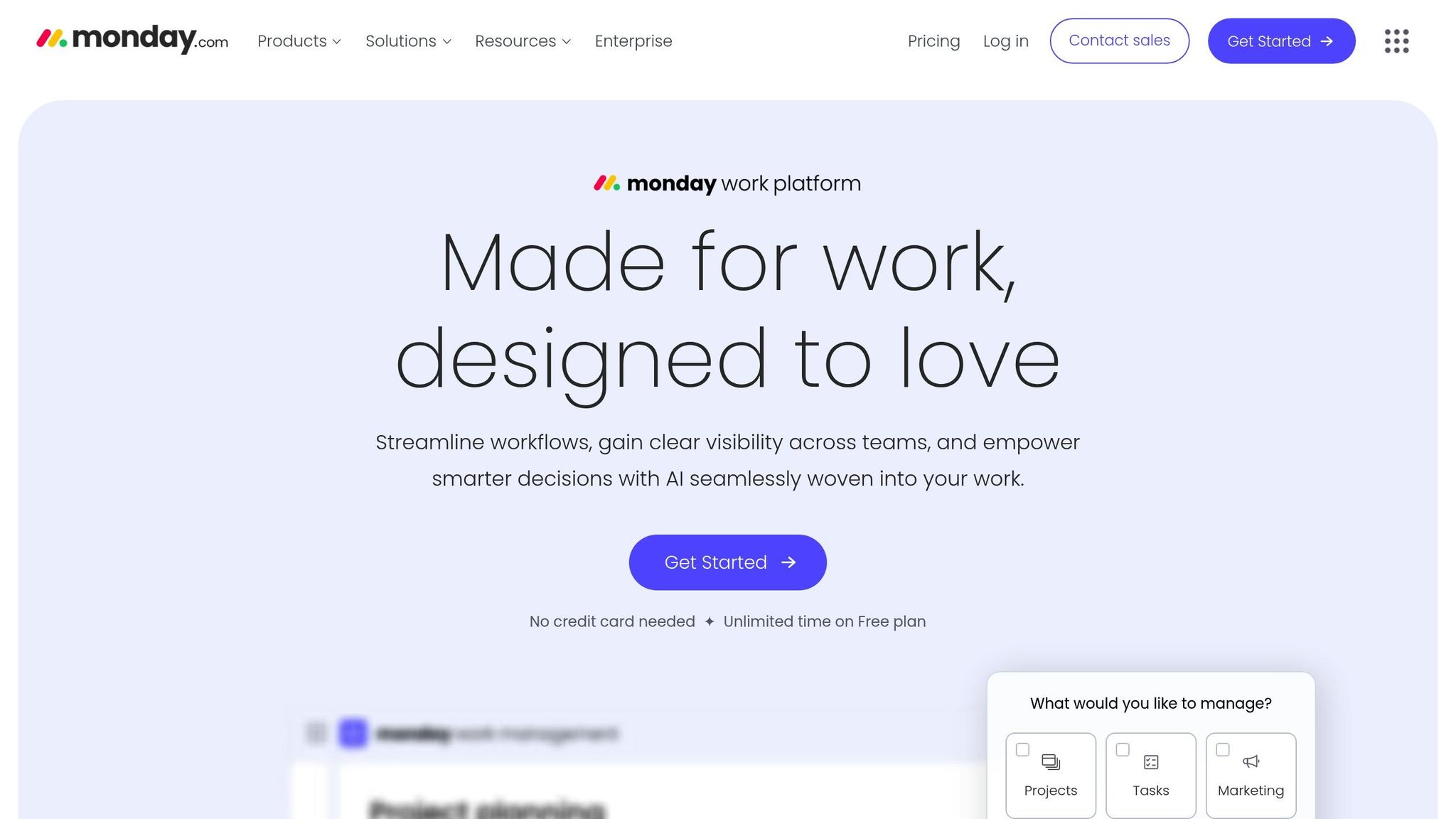
Monday.com is a project management platform designed to cater to the specific needs of businesses in the GCC region. Trusted by over 180,000 large companies globally, it offers features tailored to small businesses in the Gulf, including multilingual support and adherence to regional regulations.
Arabic/English Bilingual Interface
With its bilingual interface, Monday.com allows effortless switching between Arabic and English. This feature is particularly useful for GCC businesses managing diverse teams. Small businesses can prepare HR and financial documents in both languages, ensuring they meet local compliance standards while improving accessibility. The ability to switch between languages ensures teams can work in their preferred language without disrupting project workflows. Moreover, Monday.com’s automation tools are designed to accommodate the region’s unique scheduling requirements.
GCC-Specific Scheduling Features
Monday.com’s workflow automation and customisable dashboards make it easy to manage tasks and notifications according to local workweeks and holidays. This flexibility is essential for businesses operating in multiple GCC countries, where holiday calendars and working days often vary. These automation tools work in harmony with the platform’s strong data security measures and VAT compliance features, which are discussed below.
Compliance with GCC Data and VAT Regulations
Adhering to local data and VAT regulations is a priority for businesses in the GCC. Cloud Concept, a certified Monday.com partner in the region, has helped over 2,750 users from leading companies implement the platform. This partnership ensures small businesses receive expert support on data residency and compliance matters specific to Gulf markets.
For VAT compliance, Monday.com offers robust reporting tools. In the UAE, for example, VAT is applied at a standard rate of 5% on most goods and services. Companies with an annual turnover exceeding AED 375,000 are required to register for VAT, while those with turnovers of AED 187,500 or more can register voluntarily. The platform’s reporting features help businesses stay compliant with VAT laws, reducing the risk of penalties that could strain cash flow.
Built on a cloud-first infrastructure, Monday.com not only supports automation but also aligns with GCC data protection and regulatory standards.
5. ClickUp GCC Edition
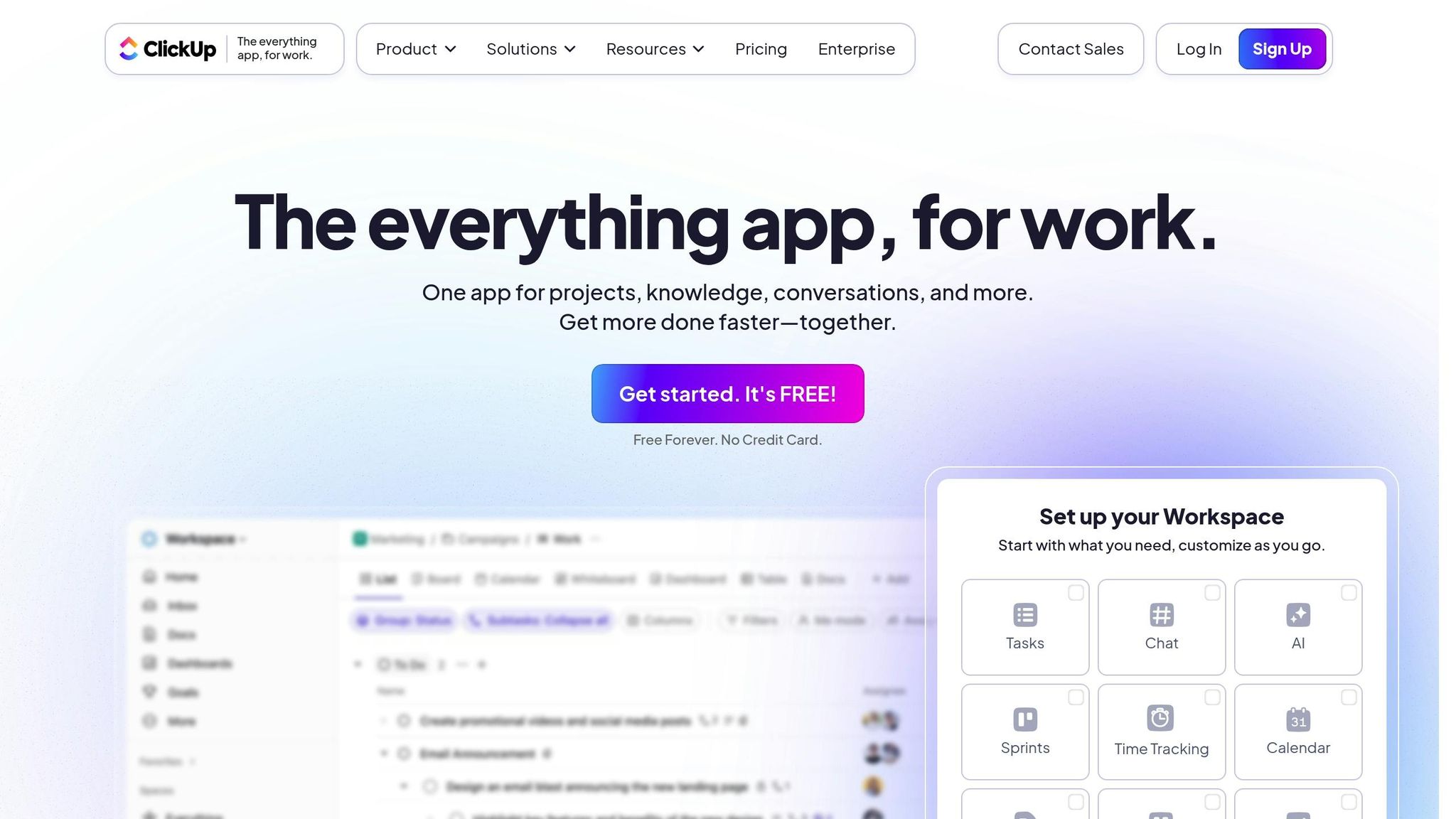
ClickUp stands out as a versatile task management tool tailored for small businesses across the Gulf. With an impressive annual recurring revenue exceeding BHD 4.2 million (around US$11 million), it has earned a reputation for reliability. Its advanced security measures make it a strong choice for GCC businesses prioritising efficiency and strict data protection.
Compliance with GCC Data Protection Requirements
ClickUp caters to the stringent data security needs of GCC businesses through top-tier security protocols. The platform is hosted on Amazon Web Services (AWS) and holds SOC 2 audit certification, which focuses on security. Additionally, it is certified under ISO 27001:2013, ISO 27017:2015, and ISO 27018:2019 standards, reflecting its commitment to maintaining high levels of security, reliability, and trust.
"Keeping our clients' data secure is an absolute top priority at ClickUp. Our goal is to provide a secure environment, while also being mindful of application performance and the overall user experience."
For companies operating across various GCC nations, ClickUp's Enterprise Plan provides the flexibility to host workspace data in data centres located in the US, Europe, or the Asia Pacific region. This option ensures businesses can meet local data residency regulations without compromising operational efficiency. The platform's security framework aligns with the high data protection standards expected in the GCC, making it comparable to other leading task management platforms in the region.
ClickUp employs TLS 1.2 encryption for communications and AES-256 encryption for data at rest. It also incorporates features like Role-Based Access Control (RBAC), Single Sign-On (SSO) support, and detailed audit logs. Furthermore, the platform complies with GDPR and maintains PCI compliance for securely handling credit card data.
To maximise security, GCC businesses are encouraged to enable Two-Factor Authentication (2FA), conduct regular audits, and use private spaces for sensitive projects. Using ClickUp's Data Processing Agreement (DPA) can also formalise compliance when managing sensitive business information.
"ClickUp offers a comprehensive suite of security measures designed to protect data, control access, and ensure compliance." – Anandhu Sivan
These robust security features make ClickUp a reliable choice for businesses seeking both effective task management and stringent data protection. Its detailed audit capabilities support regulatory compliance while providing valuable tools for monitoring internal security through precise records of user activity and data access.
6. Wrike Regional
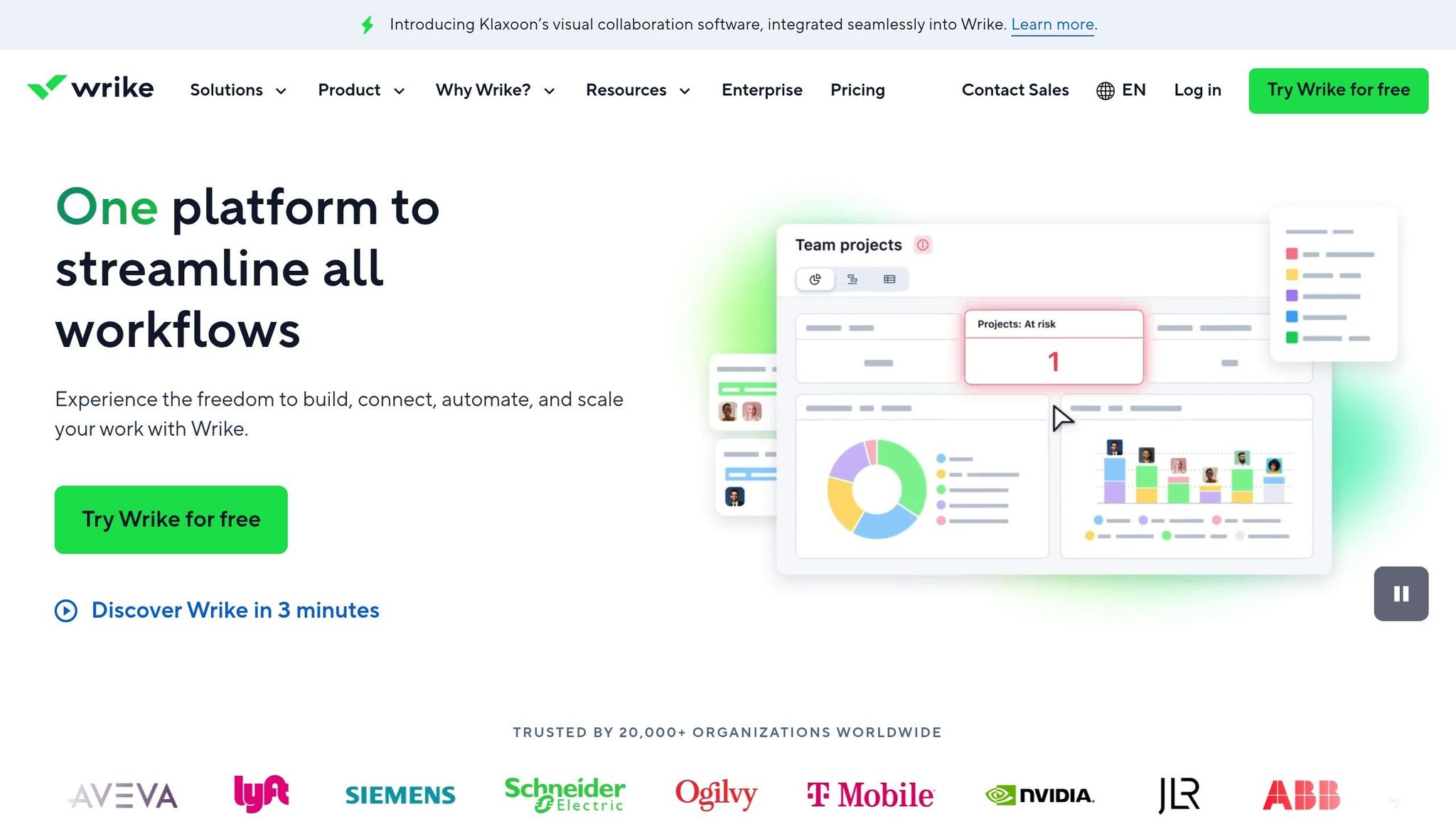
Wrike brings a tailored approach to project management with its flexible workflows and ability to cater to local needs. Designed with GCC small businesses in mind, Wrike offers customisable dashboards and agile tools that work well for teams of all sizes across the Gulf region. Its flexible project management features make it a solid choice for handling the diverse operational needs found in this area.
Tailored Scheduling for GCC Needs
Wrike stands out with its ability to meet the unique scheduling demands of GCC businesses. Its planning tools, powered by AI, help predict potential bottlenecks and ensure efficient resource allocation. The platform’s support for agile project management allows teams to adjust timelines and deliverables quickly, all while keeping projects on track. This adaptability aligns well with Wrike’s emphasis on meeting regional compliance standards.
Meeting GCC Data and VAT Compliance
Compliance is a critical factor for businesses in the GCC, especially when it comes to data privacy and VAT regulations. Wrike supports businesses in aligning with local laws, ensuring that data handling practices meet strict privacy and security standards. With the UAE’s reputation as a hub for innovation and its fast-evolving business environment, maintaining compliance is both a challenge and a necessity. Wrike helps businesses stay on top of these requirements through regular audits and secure data management practices.
7. Zoho Projects Arabia
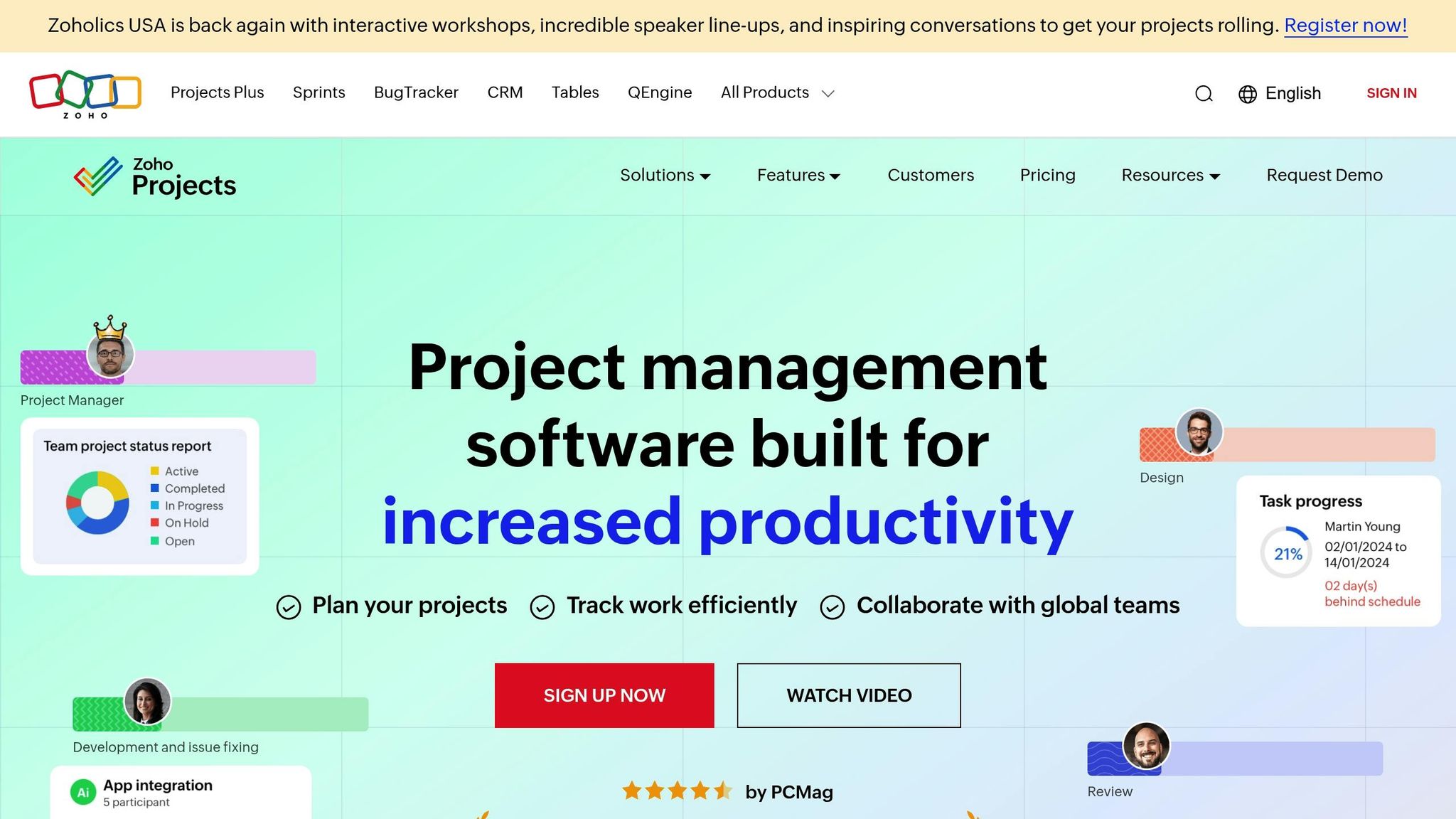
Zoho Projects Arabia wraps up the list, offering a project management solution tailored specifically for small businesses in the GCC region. With a strong global reputation and a focus on localisation and regional compliance, it’s a great fit for businesses in Bahrain and the Gulf.
Arabic/English Bilingual Interface
One of the standout features is its bilingual interface, seamlessly supporting both Arabic and English with proper right-to-left (RTL) formatting for Arabic users.
Abacus IT Solutions remarked, "Zoho Books offers a dual language interface (English & Arabic), making it accessible to diverse teams and clients."
Users can easily select their preferred language based on browser settings, their Zoho account preferences, or personal choices. This flexibility is especially helpful for teams working with both local and international clients.
Integration with Regional Payment Systems
Zoho Projects Arabia simplifies financial management by integrating with regional payment systems such as PayTabs, Telr, and Tap Payments. These integrations support multiple currencies and ensure smooth invoicing processes while adhering to local financial regulations.
Compliance with GCC Data and VAT Regulations
The platform also ensures compliance with GCC-specific data and VAT regulations by integrating with Zoho Books, which meets ZATCA requirements for financial data.
– Alchemist: "Zoho Projects is ideal for businesses in Saudi Arabia as it supports Arabic, integrates with VAT-compliant solutions like Zoho Books, and offers features tailored to streamline project workflows and enhance collaboration."
In March 2024, Zoho made a significant investment in the region by opening two data centres in Jeddah and Riyadh, backed by SAR 500 million. Additionally, the company allocated SAR 100 million annually in wallet credits to support regional businesses.
– Shadez Infotech: "Zoho prioritises data security and privacy. Its applications feature robust security measures, including encryption, access controls, and secure data storage. Zoho also adheres to Saudi Arabia's data protection regulations, ensuring your business data is handled securely and compliantly."
With its emphasis on data security, regulatory compliance, and localisation, Zoho Projects Arabia stands out as an excellent choice for small businesses in Bahrain and the GCC. It ensures project management activities align with local requirements while maintaining top-notch data protection standards.
Feature Comparison Chart
When choosing a task management app tailored to GCC regulatory and cultural needs, it's essential to consider how well each platform aligns with regional compliance and localisation requirements. Below is a detailed comparison of popular apps:
| Feature | Todoist Business | Trello Enterprise | Asana for GCC Teams | Monday.com Localised | ClickUp GCC Edition | Wrike Regional | Zoho Projects Arabia |
|---|---|---|---|---|---|---|---|
| Bilingual Support (Arabic/English) | Limited | Basic | Partial | Yes | Enhanced | Standard | Full RTL Support |
| GCC Holiday Calendar | Manual Setup | Custom Fields | Template Based | Pre-configured | Automated | Regional Templates | Built-in |
| VAT Compliance Integration | Third-party | External Tools | Limited | Moderate | Advanced | Basic | Full ZATCA Integration |
| Local Payment Systems | Standard | Basic | Limited | Regional Focus | Comprehensive | Moderate | PayTabs, Telr, Tap |
| Data Hosting Location | Global | US/EU | Global | Regional Options | Flexible | Global | Jeddah & Riyadh |
| WPS Compliance | No | No | Limited | Partial | Yes | No | Full Support |
| Multi-currency Support | Basic | Limited | Standard | Enhanced | Advanced | Standard | Regional Currencies |
| Compliance Certifications | ISO 27001 | SOC 2 | SOC 2, ISO 27001 | Multiple | Comprehensive | Enterprise Grade | ZATCA Certified |
This table highlights the strengths of each platform, helping you make a more informed decision.
Key Observations
Language and Localisation
When it comes to bilingual support, Zoho Projects Arabia leads the pack with full Arabic compatibility, including proper right-to-left (RTL) formatting. This feature is critical for businesses dealing with government documentation or clients who prefer Arabic.
VAT Compliance
VAT integration is an essential feature for GCC businesses. With the UAE imposing a 5% VAT and Saudi Arabia standardising at 15%, platforms like Zoho Projects Arabia shine with their full ZATCA integration, meeting the mandatory electronic invoicing requirements for Saudi taxpayers.
Data Hosting and Sovereignty
Data protection laws in the GCC are strict, with penalties ranging from approximately BHD 1,000 in Bahrain to USD 1.33 million in Saudi Arabia. Platforms like Zoho Projects Arabia offer data hosting in Jeddah and Riyadh, ensuring compliance with these laws. Other platforms, such as Monday.com Localised, provide regional hosting options, though global platforms may fall short in this area.
Wage Protection System (WPS)
WPS compliance is mandatory in both the UAE and Saudi Arabia. While some platforms lack this feature, Zoho Projects Arabia includes full WPS support, making it a standout choice for businesses that need to meet this requirement.
Payment Integration
Regional payment gateway support is another critical factor. Apps like Zoho Projects Arabia offer integration with PayTabs, Telr, and Tap Payments, ensuring seamless invoicing and adherence to local banking regulations.
Document Retention
Tax record retention laws vary across the GCC. UAE businesses must retain records for five years, while Saudi businesses require six years for VAT and Zakat documentation. Platforms with a regional focus often automate these requirements, saving businesses time and ensuring compliance.
Final Thoughts
While global platforms often bring robust functionality, GCC-specific solutions like Zoho Projects Arabia excel in regulatory compliance and localisation. The right choice depends on balancing international features with the specific needs of the GCC market.
Final Thoughts
When deciding on the right task management app for your GCC small business, it's all about finding the sweet spot between features, pricing, and how well the tool aligns with your team's working style. ClickUp offers a standout free plan with unlimited tasks and members, making it a great choice for growing teams. Paid plans start at around BHD 2.66 per user monthly. Trello, with its simple and intuitive Kanban board system, provides affordable upgrades starting at approximately BHD 1.90 per user monthly. Meanwhile, Todoist, named PCMag's Editors' Choice winner, delivers a structured approach with plans beginning at around BHD 1.52 per user monthly.
Beyond just pricing, it’s crucial to pick a tool that fits the local work culture. In Bahrain, where personal relationships and team collaboration often take precedence over rigid deadlines, choosing an app that encourages communication and teamwork is essential. With Bahrain’s strong digital infrastructure, prioritise apps with robust mobile access to keep distributed teams connected on the go.
Cultural nuances also play a significant role. The hierarchical decision-making processes common in GCC businesses make features like clear permission settings and approval workflows indispensable. Tools with real-time commenting, file sharing, and customisable dashboards can help manage teams that rely on consensus-driven decisions.
Your team's technical comfort level should also guide your choice. For example, while ClickUp offers extensive customisation options, it does come with a steeper learning curve. On the other hand, simpler tools like Trello or Todoist might be better suited for teams looking to get up and running quickly without diving into complex configurations. Considering that 73% of Bahraini consumers appreciate personalised experiences, look for apps that offer custom dashboards and adaptable project views.
For businesses mindful of their budget, options like Zoho Projects or Asana provide competitive entry-level plans that cater to scaling teams. The best approach? Start with a free plan, test how well it works for your team, and then upgrade based on actual needs rather than assumptions. This gradual scaling ensures that your choice aligns with your budget, delivers the right functionality, and respects the cultural dynamics of your team.
FAQs
What should I consider when choosing a task management app for my small business in the GCC region?
When picking a task management app for your small business in the GCC, it’s important to focus on the features that align with your specific needs. Look for tools that offer collaboration features, scheduling capabilities, and task tracking to help simplify workflows and boost productivity.
Opt for an app that’s user-friendly and works well with the tools you’re already using. In today’s business environment, mobile access and support for remote work are key considerations. It’s also crucial to choose an app that adheres to local data protection laws and provides customer support familiar with the unique needs of businesses in the GCC.
For small businesses in Bahrain, you might want to explore apps that cater to local preferences. Features like Arabic language support or the ability to customise the app to fit the region’s work culture can make a big difference.
What features should a task management app have to meet GCC compliance requirements?
When selecting a task management app that aligns with GCC compliance standards, it's crucial to focus on features that ensure data security and adhere to local regulations. Here are some key factors to keep in mind:
- Data residency: Choose an app that stores data within the GCC region to meet local data protection requirements.
- Robust security measures: Prioritise apps offering encryption, multi-factor authentication, and user access controls to protect sensitive information effectively.
- Regulatory compliance support: Look for features like audit trails, compliance reporting, and seamless integration with other compliant systems to stay aligned with regulations.
- Collaboration features: Ensure the app provides secure and efficient teamwork tools that meet regional standards.
These features not only help your business remain compliant but also support smooth and secure operations.
How do task management apps support bilingual communication and local payment options in the GCC?
Task management apps in the GCC are tailored to address the region's specific requirements, offering bilingual interfaces and compatibility with local payment methods. With support for both Arabic and English, these apps make it easier for multilingual teams to collaborate effectively and ensure accessibility for a wide range of users.
To meet the needs of local businesses, many of these apps integrate with popular GCC payment systems. They support currencies like the Bahraini Dinar (BHD), Saudi Riyal (SAR), and UAE Dirham (AED), while also working with trusted payment methods such as STC Pay and Mada. This makes handling transactions smoother and aligns with customer preferences across the region.
By providing these features, task management apps not only boost productivity but also simplify operations, helping businesses across the GCC navigate a fast-paced, multilingual market with ease.